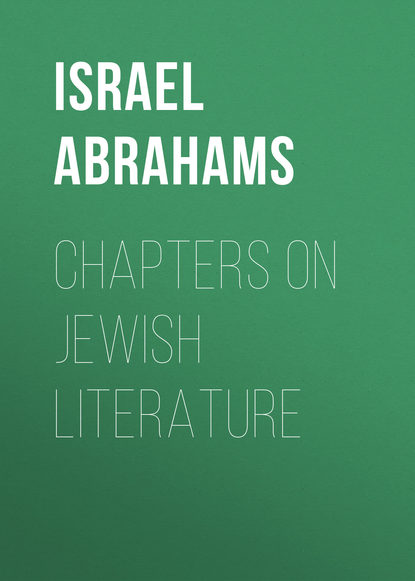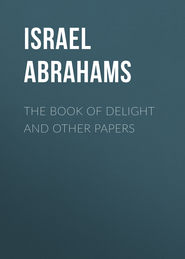По всем вопросам обращайтесь на: info@litportal.ru
(©) 2003-2024.
✖
Chapters on Jewish Literature
Настройки чтения
Размер шрифта
Высота строк
Поля
Several of Abraham Ibn Ezra's hymns are instinct with the spirit of resignation. Here is one of them:
I hope for the salvation of the Lord,
In him I trust, when fears my being thrill,
Come life, come death, according to his word,
He is my portion still.
Hence, doubting heart! I will the Lord extol
With gladness, for in him is my desire,
Which, as with fatness, satisfies my soul,
That doth to heaven aspire.
All that is hidden shall mine eyes behold,
And the great Lord of all be known to me,
Him will I serve, his am I as of old;
I ask not to be free.
Sweet is ev'n sorrow coming in his name,
Nor will I seek its purpose to explore,
His praise will I continually proclaim,
And bless him evermore.
Ibn Ezra wandered over many lands, and even visited London, where he stayed in 1158. Ibn Ezra was famed, not only for his poetry, but also for his brilliant wit and many-sided learning. As a mathematician, as a poet, as an expounder of Scriptures, he won a high place in Jewish annals. In his commentaries he rejected the current digressive and allegorical methods, and steered a middle course between free research on the one hand, and blind adherence to tradition on the other. Ibn Ezra was the first to maintain that the Book of Isaiah contains the work of two prophets—a view now almost universal. He never for a moment doubted, however, that the Bible was in every part inspired and in every part the word of God. But he was also the father of the "Higher Criticism." Ibn Ezra's pioneer work in spreading scientific methods of study in France was shared by Joseph Kimchi, who settled in Narbonne in the middle of the twelfth century. His sons, Moses and David, were afterwards famous as grammarians and interpreters of the Scriptures. David Kimchi (1160-1235) by his lucidity and thoroughness established for his grammar, "Perfection" (Michlol), and his dictionary, "Book of Roots," complete supremacy in the field of exegesis. He was the favorite authority of the Christian students of Hebrew at the time of the Reformation, and the English Authorized Version of 1611 owed much to him.
At this point, however, we must retrace our steps, and cast a glance at Hebrew literature in France at a period earlier than the era of Ibn Ezra.
BIBLIOGRAPHY
Translations Of Spanish-Hebrew Poems:
Emma Lazarus.—Poems (Boston, 1889).
Mrs. H. Lucas.—The Jewish Year (New York, 1898), and in Editions of the Prayer-Books. See also (Abrahams) J.Q.R., XI, p. 64.
Ibn Gebirol.
Graetz.—III, 9.
D. Rosin.—The Ethics of Solomon Ibn Gebirol, 7. J.Q.R., III, p. 159.
Moses Ibn Ezra.
Graetz.—III, p. 319 [326].
Abraham Ibn Ezra.
Graetz.—III, p. 366 [375].
Abraham Ibn Ezra's Commentary on Isaiah (tr. by M. Friedländer, 1873).
M. Friedländer.—Essays on Ibn Ezra (London, 1877). See also Transactions of the Jewish Historical Society of England, Vol. II, p. 47, and J. Jacobs, Jews of Angevin England, p. 29 seq.
Kimchi Family.
Graetz.—III, p. 392 [404].
Spanish-Jewish Exegesis And Poetry.
Steinschneider.—Jewish Literature, pp. 141, 146-179.
CHAPTER XI
RASHI AND ALFASSI
Nathan of Rome.—Alfassi.—Rashi.—Rashbam.
Before Hebrew poets, scientists, philosophers, and statesmen had made Spain famous in Jewish annals, Rashi and his school were building up a reputation destined to associate Jewish learning with France. In France there was none of the width of culture which distinguished Spain. Rashi did not shine as anything but an exponent of traditional Judaism. He possessed no graces of style, created no new literature. But he represented Judaism at its simplest, its warmest, its intensest. Rashi was a great writer because his subject was great, not because he wrote greatly.
But it is only a half-truth to assert that Rashi had no graces of style. For, if grace be the quality of producing effects with the least display of effort, then there was no writer more graceful than Rashi. His famous Commentary on the Talmud is necessarily long and intricate, but there is never a word too much. No commentator on any classic ever surpassed Rashi in the power of saying enough and only enough. He owed this faculty in the first place to his intellectual grasp. He edited the Talmud as well as explained it. He restored the original text with the surest of critical instincts. And his conscience was in his work. So thoroughly honest was he that, instead of slurring over difficulties, he frankly said: "I cannot understand … I do not know," in the rare cases in which he was at a loss. Rashi moreover possessed that wondrous sympathy with author and reader which alone qualifies a third mind to interpret author to reader. Probing the depth of the Talmud, Rashi probed the depth of the learned student, and realized the needs of the beginner. Thus the beginner finds Rashi useful, and the specialist turns to him for help. His immediate disciples rarely quote him by name; to them he is "the Commentator."
Rashi was not the first to subject the Talmud to critical analysis. The Gaonim had begun the task, and Nathan, the son of Yechiel of Rome, compiled, in about the year 1000, a dictionary (Aruch) which is still the standard work of reference. But Rashi's nearest predecessor, Alfassi, was not an expounder of the Talmud; he extracted, with much skill, the practical results from the logical mazes in which they were enveloped. Isaac, the son of Jacob Alfassi, derived his name from Fez, where he was born in 1013. He gave his intellect entirely to the Talmud, but he acquired from the Moorish culture of his day a sense of order and system. He dealt exclusively with the Halachah, or practical contents of the Rabbinic law, and the guide which he compiled to the Talmud soon superseded all previous works of its kind. Solomon, the son of Isaac, best known as Rabbi Shelomo Izchaki (Rashi), was born in 1040, and died in 1105, in Troyes, in Champagne. From his mother, who came of a family of poets, he inherited his warm humanity, his love for Judaism. From his father, he drew his Talmudical knowledge, his keen intellect. His youth was a hard one. In accordance with medieval custom, he was married as a boy, and then left his home in search of knowledge rather than of bread. Of bread he had little, but, starved and straitened in circumstances though he was, he became an eager student at the Jewish schools which then were dotted along the Rhine, residing now at Mainz, now at Speyer, now at Worms. In 1064 he settled finally in Troyes. Here he was at once hailed as a new light in Israel. His spotless character and his unique reputation as a teacher attracted a vast number of eager students.
Of Rashi's Commentary on the Talmud something has already been said. As to his exposition of the Bible, it soon acquired the widest popularity. It was inferior to his work on the Talmud, for, as he himself admitted in later life, he had relied too much on the Midrash, and had attended too little to evolving the literal meaning of the text of Scripture. But this is the charm of his book, and it is fortunate that he did not actually attempt to recast his commentary. There is a quaintness and fascination about it which are lacking in the pedantic sobriety of Ibn Ezra and the grammatical exactness of Kimchi. But he did himself less than justice when he asserted that he had given insufficient heed to the Peshat (literal meaning). Rashi often quotes the grammatical works of Menachem and Dunash. He often translates the Hebrew into French, showing a very exact knowledge of both languages. Besides, when he cites the Midrash, he, as it were, constructs a Peshat out of it, and this method, original to himself, found no capable imitators.
Through the fame of Rashi, France took the leadership in matters Talmudical. Blessed with a progeny of famous men, Rashi's influence was carried on and increased by the work of his sons-in-law and grandsons. Of these, Samuel ben Meir (Rashbam, 1100-1160) was the most renowned. The devoted attention to the literature of Judaism in the Rhinelands came in the nick of time. It was a firm rock against the storm which was about to break. The Crusades crushed out from the Jews of France all hope of temporal happiness. When Alfassi died in 1103 and Rashi in 1105, the first Crusade had barely spent its force. The Jewish schools in France were destroyed, the teachers and scholars massacred or exiled. But the spirit lived on. Their literature was life to the Jews, who had no other life. His body bent over Rashi's illuminating expositions of the Talmud and the Bible, the medieval Jew felt his soul raised above the miseries of the present to a world of peace and righteousness, where the wicked ceased from troubling, and the weary were at rest.
BIBLIOGRAPHY
Alfassi And Rashi.
Graetz.—III, p. 285 [292] seq.
Alfassi.
I.H. Weiss.—J.Q.R., I, p. 290.
Rashi.
Schiller-Szinessy.—Encycl. Brit., Vol. XX, p. 284.
CHAPTER XII
THE SPANISH-JEWISH POETS (II)
Jehuda Halevi.—Charizi.
Turning once more to the brighter condition of Jewish literature in Spain, we reach a man upon whom the whole vocabulary of praise and affection has been exhausted; a man of magnetic attractiveness, whom contemporaries and successors have agreed to admire and to love. Jehuda Halevi was born in Toledo about 1085, the year in which Alfonso VI recaptured the city from the Moors. It was a fit birth-place for the greatest Jewish poet since Bible times. East and West met in Toledo. The science of the East there found Western Christians to cultivate it. Jew, Moor, and Christian displayed there mutual toleration which existed nowhere else. In the midst of this favorable environment Jehuda Halevi grew to early maturity. As a boy he won more than local fame as a versifier. At all festive occasions his verses were in demand. He wrote wedding odes, elegies on great men, eulogies of the living. His love poems, serenades, epigrams of this period, all display taste, elegance, and passion.
The second period of Jehuda Halevi's literary career was devoted to serious pursuits, to thoughts about life, and to practical work. He wrote his far-famed philosophical dialogue, the Cuzari, and earned his living as a physician. He was not an enthusiastic devotee to medicine, however. "Toledo is large," he wrote to a friend, "and my patients are hard masters. I, their slave, spend my days in serving their will, and consume my years in healing their infirmities." Before making up a prescription, he, like Sir Thomas Browne, used to say a prayer in which he confessed that he had no great faith in the healing powers of his art. Jehuda Halevi was, indeed, dissatisfied with his life altogether. "My heart is in the East, but I am sunk in the West," he lamented. He was unhappy because his beloved was far from him; his lady-love was beyond the reach of his earnest gaze. In Heine's oft-quoted words,







